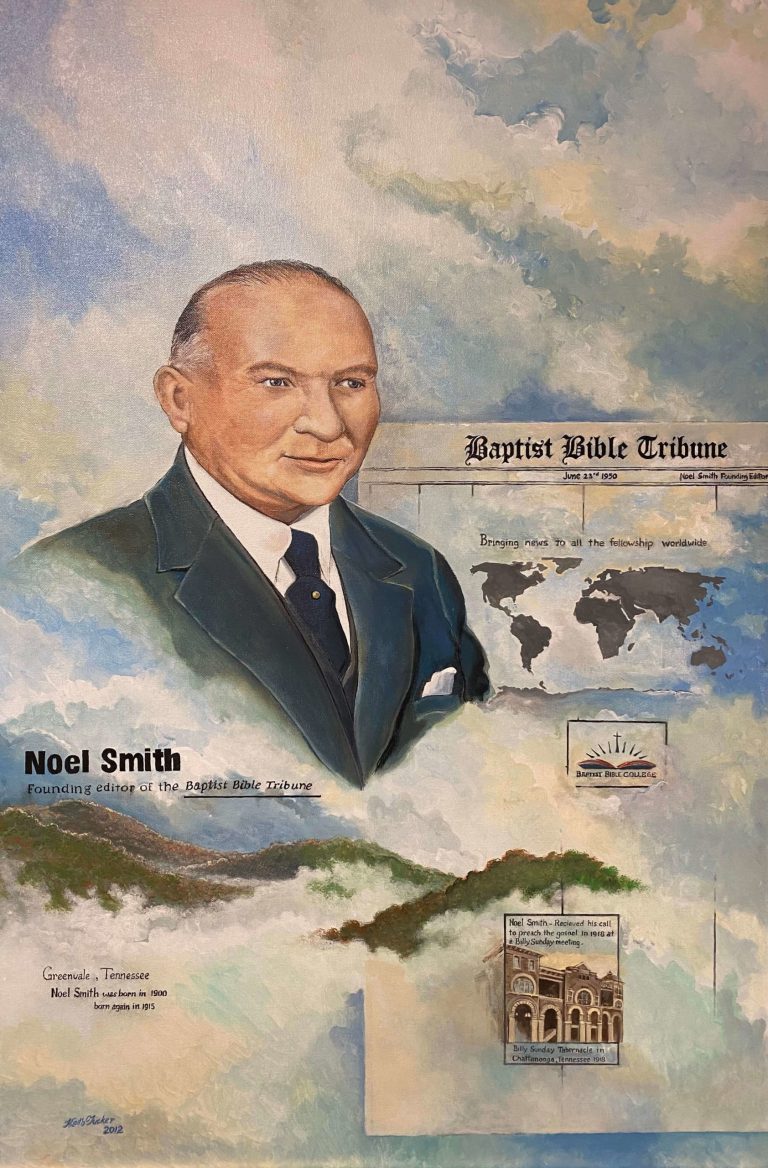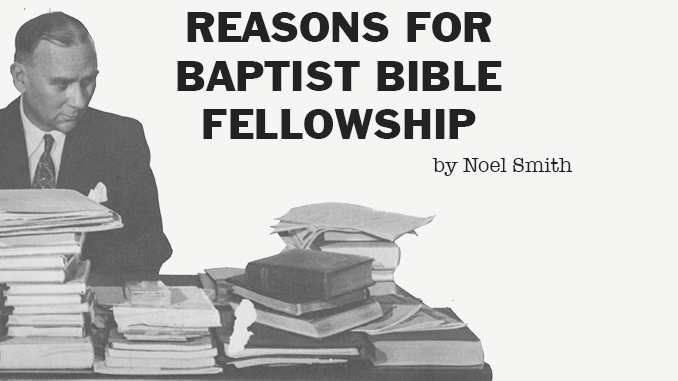Noel Smith
“[He] summed up his life this way: ‘Many times it is possible to meet people who remind you of other people. Not so with Noel Smith. … He was unique.’”
(Norma Gillming)
Early Years and Conversion
Noel Smith was born on August 7, 1900, in Greenvale, Wilson County, Tennessee. When he was still a child his family relocated to Murfreesboro, Tennessee, where he lived until the age of 17. His formal education ended after the eighth grade due to the family’s financial struggles: from age ten he went to work to help support his parents and himself.
At age 15 he was converted to Christianity in the Sunday School of the First Presbyterian Church in Murfreesboro. He vividly recalled the moment: “I was saved when I was 15 … on the steps which led from the Sunday School assembly room up to the balcony in the First Presbyterian Church, Murfreesboro, Tenn., on a bright Sunday morning in March.”
Despite his limited formal schooling, Smith possessed an impressive drive for self-education. He began studying Scripture and reading widely from authors such as I. M. Haldeman, J. M. Gray, R. A. Torrey and others of the earlier evangelical tradition.
Early Ministry and Itinerant Work
Before entering full-time ministry, Smith worked for about fifteen years in the railway express business, affiliated with the Nashville-Chattanooga & St. Louis Railway and later the Louisville & Nashville Railroad. In fall 1930 he resigned that railroad job and was ordained into the gospel ministry by Second Baptist Church of Clarksville, Tennessee. He then went into itinerant evangelistic work: tent meetings, open-air services, noon-shop meetings in factories and rail yards. He recounted how he would set up a tent himself, change clothes, and preach twice a day for four or five weeks at a time.
During this period he married Mattie Linda Stuart in 1932 in Dixon, Tennessee. They endured the lean years of the Great Depression, selling possessions just to keep going while the itinerant ministry slowly grew.
Founding the Baptist Bible Tribune and the Baptist Bible Fellowship
One of Smith’s most enduring contributions was in evangelical publishing and fellowship-building. He served on the staff of the Bible Baptist Seminary under J. Frank Norris in Fort Worth, Texas, and worked as editor of Norris’s paper, The Fundamentalist, until about 1950.
But Smith envisioned a distinct channel for independent Baptist churches—those outside the Southern Baptist Convention—that emphasised evangelism, local church autonomy and world mission. In May 1950, the organizational meeting of the Baptist Bible Fellowship (BBF) took place, and shortly afterward Smith announced the magazine he would edit: the Baptist Bible Tribune. From June 23, 1950, until his death in 1974, Smith served as the founding editor of the Tribune, building its circulation to around 27,000 by the year of his death. Through the pages of the Tribune he championed the goals of the BBF: missions, biblical separation (in the independent Baptist sense), local church outreach and evangelism. His editorials were widely read among independent Baptist pastors and churches.
Leadership Ethos and Ministry Principles
Smith’s character reflects several consistent themes:
- Local church evangelism: Throughout his life he emphasised direct gospel outreach—whether in revival tents, factory noon meetings or open-air services.
- Publishing as ministry: Realizing the power of the printed word, Smith combined pastoral heart with editorial discipline. He arrived at his office at 8 a.m. each day and left at 5 p.m., often carrying briefcases filled with evening work.
- Scholarship from the heart: Despite minimal formal education, Smith’s writings, sermons and editorials displayed clarity of thought, theological conviction and a passion for mission—proof that formal credentials are not the only marks of effective ministry.
- Mission-mindedness: He was deeply concerned about the world and the role of independent Baptists in global outreach. He wrote critically about the SBC when it came to church autonomy or court cases involving churches wishing to withdraw.
Later Years and Death
Smith continued his editorial and teaching work until his passing. On January 12, 1974, Noel Smith died in Springfield, Missouri. His wish to be buried in his native Tennessee was honored when his body was interred in Mount Olive Cemetery, Knoxville, Tennessee.
Legacy and Influence
Even decades after his death, Smith’s influence remains in several ways:
- The Baptist Bible Tribune continues (though under new management) as a voice for independent Baptist churches. His foundational role in its creation and growth ensured that there was a means of communication and accountability among churches outside the main denominational structures.
- The Baptist Bible Fellowship traces part of its origin to the movement he helped articulate and publish. His editorials and leadership helped give cohesion to what was otherwise a loose network of independent churches.
- Model of publishing ministry: His life encourages pastors and ministry leaders to recognise that influences beyond the local pulpit—such as print media, editing, and writing—can multiply their impact.
- Pastoral-tent evangelism memories: Smith’s early years provide a reminder of a bygone era of evangelistic tent-meetings, factory noon revival meetings, and personal sacrifice. His story keeps alive the sense that gospel ministry often involves struggle, pioneering, and steadfastness.
- Local church autonomy emphasis: For those in that tradition of Baptist polity, Smith’s writings remain a touchstone for the importance of local church self-governance, mission focus, and independent operation from large denominational bureaucracies.
Practical Lessons for Today
From Noel Smith’s life, several practical takeaways can be drawn for ministry and Christian leadership:
- You don’t need formal academia to make an impact: Smith’s eighth-grade education did not hinder him; what mattered was his devotion, discipline and teaching of Scripture.
- Publishing amplifies ministry: Whether it is a magazine, blog, podcast or journal, creating a platform that gathers and shares ideas can extend a leader’s influence far beyond their immediate circle.
- Evangelism remains fundamental: Smith never lost his passion for the lost—he began with tent meetings and carried that spirit into his editorial work.
- Vision and network matter: He recognised the importance of fellowship among like-minded churches (the BBF) and used the Tribune to weave those into a movement.
- Legacy is built over decades: Smith’s ministry wasn’t about quick wins—it spanned decades of service, writing, editing and relational investment.
Conclusion
Noel Smith may not be as widely known outside the circles of independent Baptist history, but within that sphere his life remains a benchmark of faithful service. From the steps of a Sunday-school conversion in Tennessee to the editorial desk of a national Baptist journal, Smith’s journey exemplifies how deep conviction, combined with strategic communication and local church focus, can shape a movement. His legacy reminds us that even those with modest formal training can serve with brilliance when yielded to Christ and devoted to His work.
_____
Image Source/Credit (in order):
- Browning, James. “Noel Smith.” Christian Hall of Fame, 27 Jan. 2021, christianhof.org/noel-smith.
- Admin, and Admin. “Reasons for the Baptist Bible Fellowship – Tribune.org.” Tribune.org – The online magazine of the Baptist Bible Fellowship, 23 May 2020, www.tribune.org/reasons-for-the-baptist-bible-fellowship.
Related
Sorry, no records were found. Please adjust your search criteria and try again.
Sorry, unable to load the Maps API.

